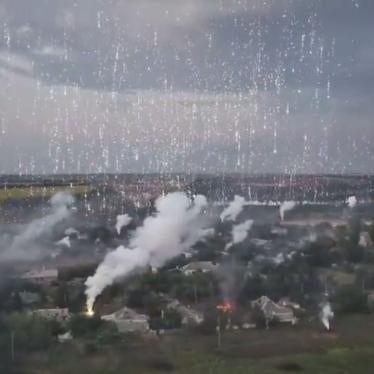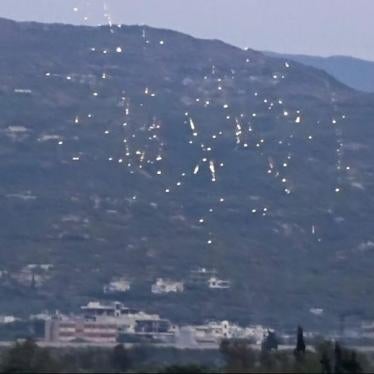On behalf of the following nine organizations: Amnesty International, Article 36, Campaña Colombiana Contra Minas, Human Rights Watch, Mines Action Canada, Mines Advisory Group, PAX, Seguridad Humana en América Latina y el Caribe (SEHLAC), Women’s International League for Peace and Freedom
Thank you, Mr. President.
This joint civil society statement has been endorsed by nine organizations.
Widespread concern for the human suffering caused by incendiary weapons was evident during the discussions of Protocol III at last year’s Review Conference. States spoke of the weapons’ “horrific human toll,” their “destructive consequences for the civilian population,” and their “horrible, social, economic, and physical impact in the mid-term and long-term.”
Almost all of the states who spoke on the topic also supported setting aside time in 2022 to discuss Protocol III. In particular, Ireland’s proposal to hold informal consultations on the “implementation and universalization” of Protocol III received significant backing. These consultations would have constituted a critical step toward assessing the adequacy of a protocol that has not been revisited since its adoption more than 40 years ago.
Due to the CCW’s reliance on consensus, however, just two states were able to block Ireland’s reasonable and widely embraced proposal. The result, which sparked outrage and frustration from other states parties, raised serious questions about the viability of the CCW process. It also represented an affront to the victims of incendiary weapons.
Those victims have experienced excruciating burns, sometimes to the bone, as well as severe respiratory damage. Individuals who survive an attack endure a lifetime of pain, scarring that restricts movement, psychological trauma, detachment from society, and an inability to work.
Over the past 15 years, the use of incendiary weapons has been documented in numerous conflicts, including in Afghanistan, Gaza, Iraq, Syria, Ukraine, and Yemen. Most recently, according to a new report, Human Rights Watch has documented at least 40 attacks in Ukraine using surface-fired incendiary weapons since February 2022.
Existing international law has failed adequately to protect civilians from the harm these weapons cause. Protocol III’s definition excludes multipurpose incendiary munitions, such as those containing white phosphorus, that are not “primarily designed” to set fires and burn people. It has weaker regulations for ground-launched incendiary weapons than air-dropped ones, even though the weapons cause the same kind of harm. States should work to strengthen existing law and close Protocol III’s loopholes.
As a start, CCW states parties should summon the energy for humanitarian action they exhibited at the 2021 Review Conference and not let last year’s consensus-driven setback deter them from future work on incendiary weapons.
We urge states parties to:
- Reiterate their grave concern at the horrific effects of incendiary weapons;
- Renew their call for a mandate for informal consultations on Protocol III; and
- Hold discussions outside the CCW, particularly if the mandate is blocked, to consider the adequacy of national and international measures to address the problems of incendiary weapons, and to find ways to create stronger international standards.
Thank you.








